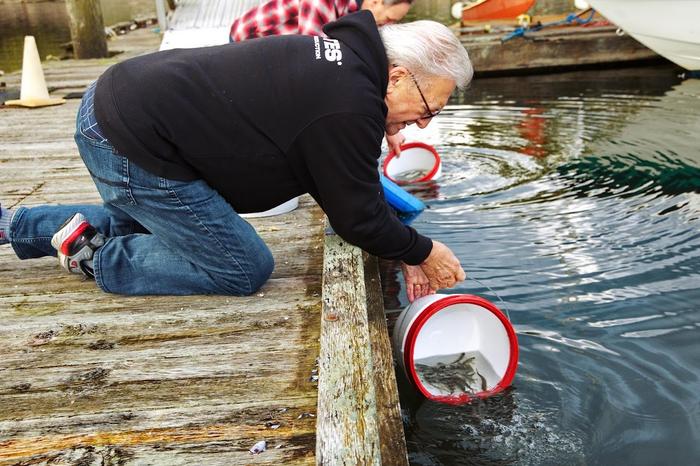When Kevin Ryan and the other hardworking volunteers at Mossom Creek Hatchery in Port Moody, B.C. release young coho smolts into the ocean, they’re never quite certain how many will return as adults.

Credit: Photo credit: Mossom Creek Hatchery
When Kevin Ryan and the other hardworking volunteers at Mossom Creek Hatchery in Port Moody, B.C. release young coho smolts into the ocean, they’re never quite certain how many will return as adults.
Mossom releases between 5,000 and 10,000 coho smolts each year, and is one of the few hatcheries to release coho directly into the ocean, rather than into a river. Until now, no research had looked at the success of direct ocean releases of coho.
UBC researchers used acoustic telemetry to tag and track coho on their journey. The results were revealing: only 60 per cent of the fish remained alive three kilometres from release. Fewer than one-quarter reached the Lions Gate Bridge 20 kilometres away.
“While low survival is not surprising during this life stage, we discovered that most mortality occurred close to the release location, likely due to predators,” said Dr. Scott Hinch, a professor in the department of forest and conservation sciences who heads the Pacific Salmon Ecology and Conservation Lab at UBC.
“Our results confirm recent studies that Burrard Inlet is a ‘mortality hot-spot’ for juvenile salmon but also suggests ways to increase the fish’s chances of survival, such as by changing the locations and ways of releasing fish.”
The hatchery will start testing different release locations, including various marine sites, and also directly into Mossom Creek.
“With the guidance of Dr. Hinch’s team, we’ll tag and monitor these fish from their release as smolts through to their return as adults to determine which approaches work best,” said Ryan, the hatchery president.
Like other community hatcheries, Mossom’s primary focus is on public education about natural resources and acting as stewards of local salmon creeks.
“As salmon runs continue to decline,” Dr. Hinch noted, “it is more important than ever to support community and volunteer-led hatcheries to improve ways to help these fish surviving their remarkable journey.”
Dr. Hinch and Mr. Ryan are available for interviews. Interview language(s): English
Journal
North American Journal of Fisheries Management
Method of Research
Observational study
Subject of Research
Animals
Article Title
Acoustic telemetry tracking of Coho Salmon smolts released from a community-run hatchery into a marine inlet reveals low early ocean survival
Article Publication Date
3-Mar-2024



